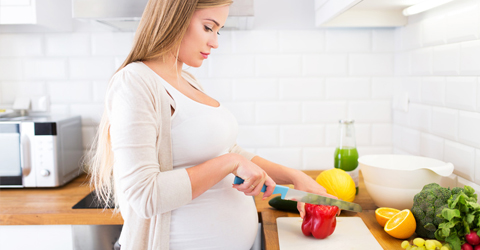

There is a common misconception out there that in order to meet your nutrition requirements for pregnancy, animal products must be included in the diet. According to a position paper on vegetarian diets from the Academy of Nutrition and Dietetics, “Well planned vegan, lacto vegetarian, and lacto-ovo vegetarian diets are appropriate for all stages of the life cycle, including pregnancy and lactation.” Eating a variety of whole plant-based foods gives you all the nutrients that you and your developing baby needs.
As you encounter the different stages of pregnancy, your body does have different requirements, regardless of what diet you are following. It is important to know how these requirements change to provide your baby the greatest chance possible of achieving optimal health. Let’s take a look at some special considerations:
Calories and Food Intake
First Trimester: at this time there is no increase in your calorie needs. Consuming adequate calories can be difficult for many women during the first trimester due to symptoms of early pregnancy such as nausea, constipation, and fatigue. Sticking to cold foods will make food more tolerable during episodes of nausea because they stimulate less your heightened sense of smell. Splitting large meals up into smaller, more frequent meals is also helpful. Foods and drinks that contain ginger are effective in managing nausea as well.
Constipation is another common side effect of pregnancy and can be managed by drinking plenty of water, keeping high fiber food intake consistent, and staying active. However, discuss additional treatment options with your doctor if these methods are not providing you with relief.
As long as you are following a healthy, well balanced plan, thriving on a plant-based diet during pregnancy is 100% possible.
Feeling fatigued is common in early pregnancy as well. And when dealing with this, it is hard to feel like preparing meals for yourself. To help with this keep healthy, convenient food, such as fruits, cut up veggies, or whole grain crackers easily available. When you feel up to it, batch cook so you have full meals ready to reheat in a snap.
Finally, don’t hesitate to Ask for Help! It is okay not to do everything on your own, even if your partner isn’t the best cook.
Second Trimester: you need an additional 340 calories per day. You will gain about 60% of your total pregnancy weight during this trimester, so be sure to get those extra calories in. Your baby is growing fast and starting to become active, so those additional calories are very important. If you were overweight before becoming pregnant, focus on increasing calories by consuming healthy whole foods. Pregnancy is not the time to try to lose weight and restrict calories.
Third Trimester: you need an additional 450 calories per day. At this point you are feeling like you are about to pop (literally). Acid indigestion, more commonly referred to as heartburn, may set in. Small frequent meals, eating more slowly, staying in an upright position after eating, and drinking fluids between meals will help to keep your calorie intake up and hopefully your indigestion at bay. If you are still finding it hard to eat, include more calorie dense foods, such as nuts, seeds, avocados, and whole grains.
Protein
If there is one thing being on a plant-based diet has taught us, it’s this-getting enough protein is definitely not a problem!
Protein needs do not increase during the first trimester, but do increase to an additional 28 grams per day starting in the fourth month and continue at that number throughout the duration of your pregnancy. Just to give you some examples of some higher in protein plant foods:
1 cup cooked soybeans = 29 grams protein
1 cup cooked lentils = 18 grams protein
1 cup cooked black beans, pinto beans, or chickpeas = 15 grams protein
4 oz tofu = 11 grams protein
1 cup cooked quinoa = 8 grams protein
2 Tbsp peanut butter = 8 grams protein
1 cup cooked spaghetti = 8 grams protein
1 cup plain soymilk = 7 grams protein
1 cup cooked spinach = 5 grams protein
1 cup cooked broccoli = 4 grams protein
Caffeine
Although the evidence on a safe level is unclear, caffeine in the amount of 200 mg per day is typically accepted for those women who want to continue to have it. According to the American College of Obstetricians and Gynecologists, you should keep your daily caffeine consumption at 200 milligrams or less to be safe. One 8 oz cup of coffee contains about 100mg of caffeine.
Supplementing Vitamins and Minerals
When eating a healthy, well planned whole food, plant-based diet, you are likely getting a wide variety of all the nutrients your body needs (except vitamin B12 which should be supplemented on any plant-based or vegan diet). However, what is unlikely is that you are eating perfectly every day throughout your entire pregnancy. And many vitamins and minerals are of extra importance during your pregnancy for you and your developing baby. Some of these are: iron, calcium, folate, vitamin B12, zinc, vitamin D, iodine, and choline. Most of these nutrients can be found in whole plant-based foods, however it is doubtful you are tracking your daily vitamin and mineral intake. Your doctor or midwife may recommend taking prenatal vitamin supplements as a good way to ensure you are meeting the recommended requirements, especially of vitamin B12 and iron. Make sure to check with your healthcare provider in regards to prenatal vitamins because pregnancy medical needs can vary from person to person.
If you have a hard time tolerating prenatal supplements, try them with food, or in a different form such as liquid, powder, or chewable. Keep in mind, the best way to get the nutrients your body needs is through food, so don’t use taking a prenatal supplement as an excuse to eat poorly! Again, make sure to consult with your healthcare provider on this.
Things to Avoid
Some foods are considered unsafe during pregnancy due to the high risk of contamination. Some of these are raw sprouts and unpasteurized juices. Also, be sure to wash all raw fruits and vegetables well prior to consumption. Some other foods to avoid that are not plant-based, but still important to know are: raw or undercooked meat or fish, raw eggs, unpasteurized dairy milk, soft dairy cheese, and hot dogs or lunch meats not cooked to an internal temperature of at least 165 degrees F.
Even though you will likely hear “Oh one glass of wine is fine” from friends and family, abstinence from alcohol during pregnancy is the best rule of thumb. Avoiding herbal teas is also recommended. And as far as smoking is concerned – just don’t do it.
To sum things up, as long as you are following a healthy, well balanced plan, thriving on a plant-based diet during pregnancy is 100% possible, and you are also setting the foundation for your baby to have lifelong healthy habits.
*Please note: this article is intended for the general purposes of women who are undergoing a healthy pregnancy. If any high risk factors arise or individual recommendations are desired, it is advised to consult with your physician, registered dietitian, or other appropriate healthcare provider regarding your plan of care.
References
- Becoming Vegan, Comprehensive Edition, 2014, by Brenda Davis, RD and Vesanto Melina, MS, RD
- https://www.caffeineinformer.com/caffeine-during-pregnancy
- https://www.drmcdougall.com/misc/2011nl/jan/pregnancy.htm
- https://www.eatright.org/health/pregnancy/prenatal-wellness/healthy-weight-during-pregnancy
- Expect the Best, 2nd Edition, Your Guide to Healthy Eating Before, During, and After Pregnancy, 2017, by Elizabeth M Ward, MS, RD
- The Everything Vegan Pregnancy Book, All You Need to Know for a Healthy Pregnancy That Fits Your Lifestyle, 2011, by Reed Mangels, PhD, RD, LD, FADA
- Pistollato F, Sumalla Cano S, Elio I, Masias Vergara M, Giampieri F, Battino M. Plant-Based and Plant-Rich Diet Patterns during Gestation: Beneficial Effects and Possible Shortcomings. Adv Nutr. 2015;6(5):581-91. Published 2015 Sep 5. doi:10.3945/an.115.009126
Copyright 2026 Center for Nutrition Studies. All rights reserved.
Deepen Your Knowledge With Our
Plant-Based Nutrition
Certificate
Plant-Based Nutrition Certificate
- 23,000+ students
- 100% online, learn at your own pace
- No prerequisites
- Continuing education credits







